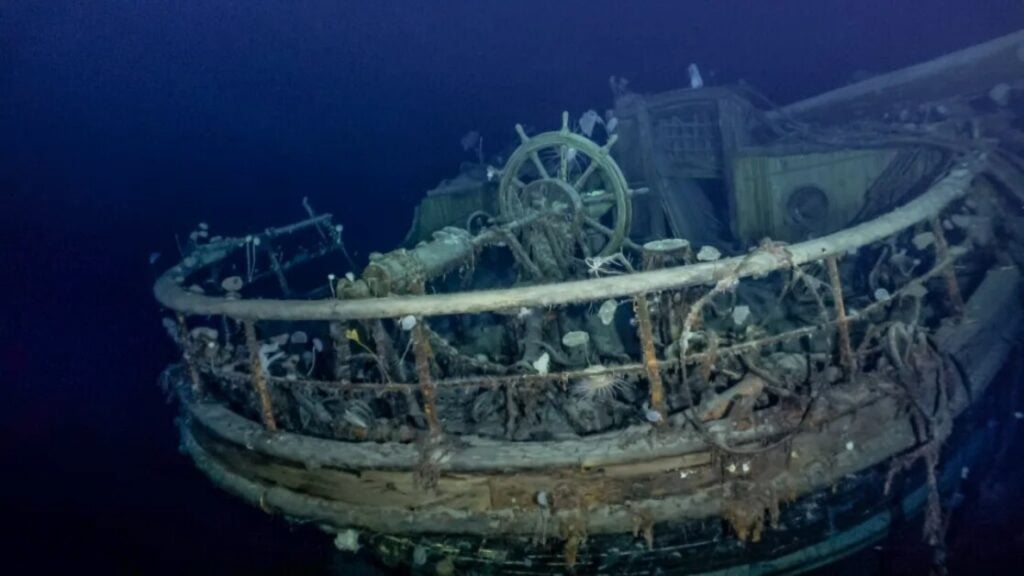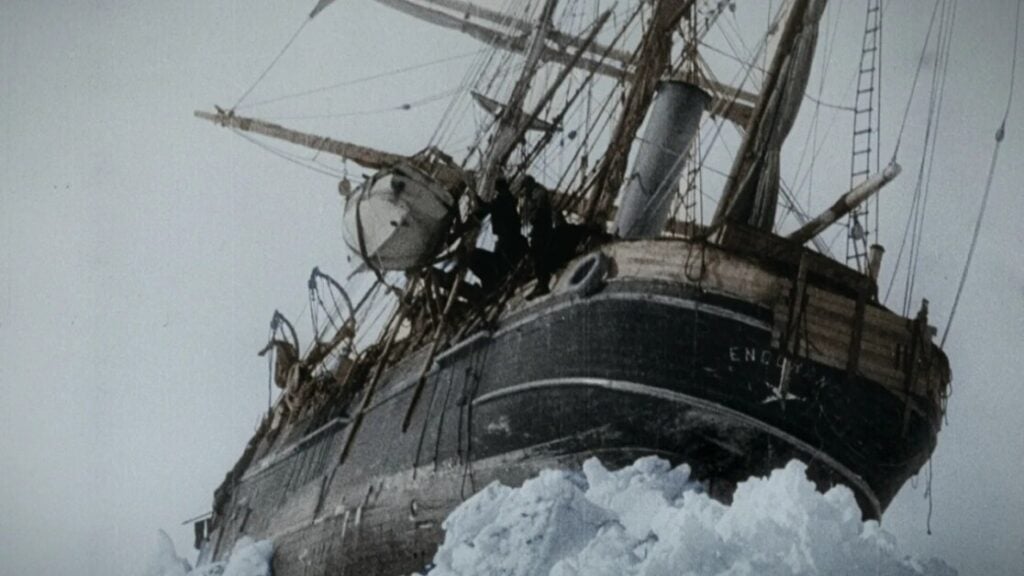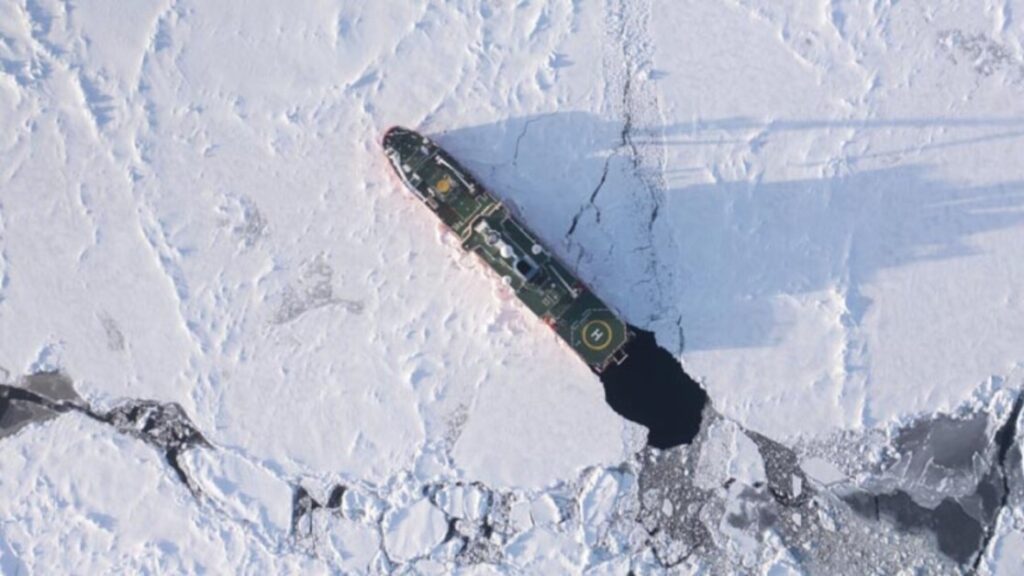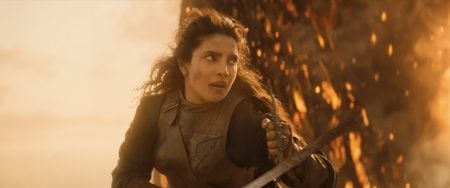After venturing out to fiction with Nyad, directors Jimmy Chin and Elizabeth Chai Vasarhelyi return to their documentary roots with Endurance. In this feature, you follow two intertwined narratives. The first centres on Irish explorer Ernest Shackleton’s expedition and the tragic sinking of his ship, the Endurance, while the second is about the 2022 mission (Endurance22) to find the wreckage of that same ship. The result is a documentary about the passion for exploration, extreme determination, testing the boundaries of the human body and endurance (in multiple ways). Geek Vibes Nation spoke to co-director/co-producer Vasarhelyi about the importance of Shackleton’s legacy, the positive usage of groundbreaking AI technology, and shaping a documentary with the different visuals available.
Geek Vibes Nation (Liselotte Vanophem): Hi Elizabeth, congratulations on the documentary. What about Ernest Shackleton’s story made you want to bring his story to life?
Elizabeth Chai Vasarhelyi (co-producer/co-writer): Jimmy and I are both interested in these types of stories of survival. It’s not just survival; it’s like human achievement. It’s like the idea of this human condition that damns us to be audacious and daring and dream the impossible. But then it requires the real work that goes into it, which involves ingenuity, creativity, diligence, determination, and often failure. So, a lot of our films explore those questions.
I’m also married to an explorer [Jimmy Chin], so Jimmy and I have always been playing with this idea. When we understood that expeditions were going on to try to find Shackleton’s boat, we were like, “This would be the opportunity,” especially given all these new creative tools we have available to us.
GVN: When you make a documentary, do you write a script as well, like when creating a fiction film? Or is the structure of the film based on the visuals and footage available?
ECV: Our documentary-making method is different from other people’s per se. There are lots of different ways of doing it. You’ll notice that most of our films have no writing credits. I credit us as directors with our editors on writing the film. We often start with like a page. When making a documentary, you must keep the constraints of the format in mind. You can’t make things up as you can with, for example, fiction.
For example, in a fiction film you can write a new scene, but in a documentary, you can’t. You’re still a journalist wanting to tell the true story. When creating a documentary, the question is, “What innovation, what different way of thinking about it, or different form of telling the story can you employ to express the truth of the situation?”. So it was the same here. The goal of making this documentary is to find the emotional and character journey that transpires.

GVN: Because of all the footage available and the visuals you filmed, some videos and pictures didn’t make it into this documentary. How do you decide which visuals to use and which to leave on the editing floor?
ECV: We think about the organic flow of a story. The organic way to understand Ernest Shackleton’s story is through the diaries, which are all primary accounts. They’re all accounts of the people who participated in the expedition. There are also multiple perspectives on the same event, which are filled with character, fear, hopes, dreams, and pain. Shackleton brought a documentarian, Frank Early, on board, who shot on film 110 years ago. They went to the most remote place on earth and filmed the most intense survival story ever.
However, we’re looking at it in 2024. When creating this documentary, we thought, “How do we understand it?” When you watch South, Frank Early’s original film, it’s a silent film with a musical accompaniment and like text cards. It was made to be shown in person in Carnegie Hall or somewhere where everyone was laughing or oohing when they saw the penguins and the horrible conditions the exploration faced. To try and understand what was being said, we hired a lip reader at first like Peter Jackson did in They Shall Not Grow Old, a World War I documentary in which they read the lips of everybody.
We also used their diaries to get as they provides us with even more stories and words. Now, there’s this fantastic AI technology that’s available, and if you have a recording of someone’s actual voice, and there were seven voices we were able to find from the 27 men, you can reanimate their own words. This was like a new type of documentary. It was a new opportunity to use new tools to tell the story we always tell.
There were amazing technological innovations that allowed us to make this film, but at the same time, the problem was the same, whereas you’ve got two stories. One’s in 2022, one’s in 1914 and 1915. How do you make them they talk to each other? It’s like the past talking to the present and the present talking to the past and we had to find a way to make it feel present.
GVN: During their expedition, Shackleton and his crew had to overcome many problems, such as the cold and remoteness. Were there any problems you, as a co-director/co-producer, faced yourself when making this feature?
ECV: The biggest problem with this film was how to make the two storylines work together because the human stakes of 1914 and 1915 Shackleton’s story are real. They could live or die. In 2022, the states were more reputational as they’ve got helicopters to look for the ship, the necessary fuel and more.
You’ve got the three best at what they do in the world. For example, Nico Vincent is the best subsea expert in the world. His innovation and work facilitated something unheard of 10 years ago: sending an autonomous submarine three kilometres deep tethered with a fibre optic cable so that you could watch it in real-time. This means that even if it’s lost or if an iceberg hits it, you still have the data. They found the boat, the Endurance, because scientists were asking questions about the algorithms and the analytical method in real time. This whole film is about how paper and science meet, like how brick and mortar or paper and pencil meet.

GVN: Shackleton’s story isn’t only about the exploration itself but also about determination, passion, teamwork, etc. What do you personally take away from his story?
ECV: He was Irish and lived in the Victorian age. He didn’t go to Oxford or Cambridge like the Royal Navy or even like the scientists in our film. He was a merchant marine, so he was from a different class. So there must be a power of character that needs to be understood without ever having met him.
It’s this idea that he had something to prove, and he ended up learning something about himself, which is that he failed spectacularly because of his outrageous objective. He failed within the first few days of it. They got stuck in the ice. But then he found that his strength was his love for his men, his loyalty, and his strength of character to inspire them with his actions and his words to find a way to survive through this horrible, horrible, like, trying experience. He had his men with him on his expedition experience.
GVN: As a director, you also have a passionate and loyal crew surrounded each other. How was it to work with such a talented team?
ECV: It’s great to see your work come to life with many passionate people who want to tell his story. We’re fortunate to work with this very tight team. In nonfiction, we’ve had the same team for 20 years. It’s really about those relationships and the connection one has. I’m grateful that audiences are responding to this film. It’s fun to make films about people who are passionate about what they do and also with people who are passionate about what they do.
GVN: That was my last question. Thank you so much for this interview, and good luck with the release.
ECV: Thank you.
Read our review of Endurance here. Check out our interview with producer Ruth Johnson, director of exploration Mensun Bound and historian and Dan Snow here.







